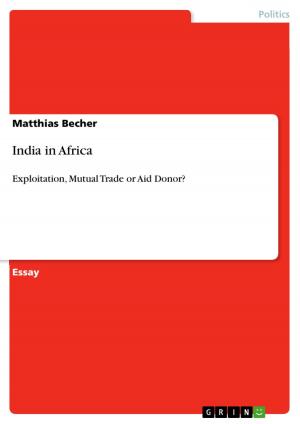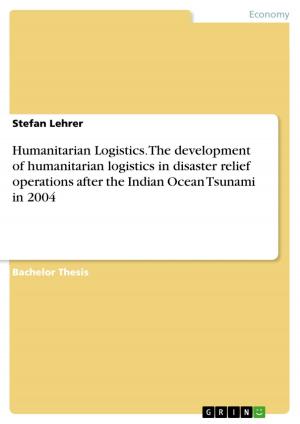The elusive quest for security continues - The European Union's foreign policy and it's implications to transatlantic relations
Nonfiction, Social & Cultural Studies, Political Science| Author: | Harald Löberbauer | ISBN: | 9783640272389 |
| Publisher: | GRIN Publishing | Publication: | February 23, 2009 |
| Imprint: | GRIN Publishing | Language: | English |
| Author: | Harald Löberbauer |
| ISBN: | 9783640272389 |
| Publisher: | GRIN Publishing |
| Publication: | February 23, 2009 |
| Imprint: | GRIN Publishing |
| Language: | English |
Master's Thesis from the year 2007 in the subject Politics - International Politics - Topic: European Union, grade: 1, University of Vienna, 240 entries in the bibliography, language: English, abstract: The title of this analysis is based on a book by Simon Duke dealing with the theoretical implications of a common European foreign policy in security and defense matters. The content of the book differs from the content of this paper and is not related to the questions posed in this research.1 Part II of this research gives a detailed overview of what security actually means in global politics and how key players understand it. General definitions and theory allows us to understand the major parts of this thesis (part III and IV). Part III describes different approaches to security in IR theory and explains it on the basis of European political integration. The historio-political analysis in this part shows the evolution of a CFSP and the ESDP. Institutionalization processes within the European Union explain the current status of the EU's foreign policy, which is a status in process without having a clear and defined goal. This part includes the legal dimension of the EU's foreign policy as well and describes the problematic situation Europeans currently have to face, namely disputes about the legal personality of the European Community and the European Union. Part IV is the second major part of the paper and deals with security challenges and the impact of the EU's foreign policy on transatlantic relations and/or vice versa. This part has a closer look on the practical side of what the European Union is able and willing to do as a key player in the political, security and military domain in the world. It shows the relations between Europe and the United States and gives a segmentary analysis of Europe's power in global politics... ...This research identifies the following specific hypotheses subordinated to the main hypotheses: 1.The European Union will become a global key player in the political and military domain, but will remain at the lower end of high politics for a while (ESDP police missions and military operations). 2.Transatlantic relations in the form of the Atlantic Alliance (or extended atlantic alliance) will remain of essential importance in order to achieve the EU's foreign policy goals. 3.Cooperation in the military domain with the United States will remain the only way for Europe during the process of building up a European military.
Master's Thesis from the year 2007 in the subject Politics - International Politics - Topic: European Union, grade: 1, University of Vienna, 240 entries in the bibliography, language: English, abstract: The title of this analysis is based on a book by Simon Duke dealing with the theoretical implications of a common European foreign policy in security and defense matters. The content of the book differs from the content of this paper and is not related to the questions posed in this research.1 Part II of this research gives a detailed overview of what security actually means in global politics and how key players understand it. General definitions and theory allows us to understand the major parts of this thesis (part III and IV). Part III describes different approaches to security in IR theory and explains it on the basis of European political integration. The historio-political analysis in this part shows the evolution of a CFSP and the ESDP. Institutionalization processes within the European Union explain the current status of the EU's foreign policy, which is a status in process without having a clear and defined goal. This part includes the legal dimension of the EU's foreign policy as well and describes the problematic situation Europeans currently have to face, namely disputes about the legal personality of the European Community and the European Union. Part IV is the second major part of the paper and deals with security challenges and the impact of the EU's foreign policy on transatlantic relations and/or vice versa. This part has a closer look on the practical side of what the European Union is able and willing to do as a key player in the political, security and military domain in the world. It shows the relations between Europe and the United States and gives a segmentary analysis of Europe's power in global politics... ...This research identifies the following specific hypotheses subordinated to the main hypotheses: 1.The European Union will become a global key player in the political and military domain, but will remain at the lower end of high politics for a while (ESDP police missions and military operations). 2.Transatlantic relations in the form of the Atlantic Alliance (or extended atlantic alliance) will remain of essential importance in order to achieve the EU's foreign policy goals. 3.Cooperation in the military domain with the United States will remain the only way for Europe during the process of building up a European military.















